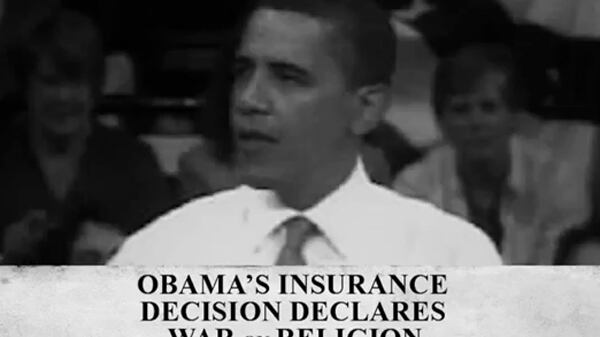The 2012 presidential race is supposed to be defined by the nation’s ongoing economic crisis, yet the most recent ad from Mitt Romney’s campaign accuses President Obama of “declar[ing] war on religion”:
“Who shares your values?” the ad asks. “President Obama used his health-care plan to declare war on religion, forcing religious institutions to go against their faith. Mitt Romney believes that’s wrong.” After a clip from a recent Romney speech in Poland in which he mentioned Pope John Paul II’s fight against communism, the ad concludes: “When religious freedom is threatened, who do you want to stand with?” (In case the point wasn’t clear, the on-screen text notes that Romney has been endorsed by Lech Walesa, the anti-Communist former Polish president.)
Who says values are “so 2004”?
Setting aside the silly charge that Obama is “at war” with anyone’s religion (which should be immediately clear to anyone familiar with his contraception-coverage compromise), the ad points to some troubling facts for the Romney campaign.
1. We’ve heard it all before. One of the challenges that Romney (like anyone running against an incumbent) must confront is that anti-Obama vitriol has been shooting through a fire hose for about five years now. Voters have heard it all, from accusations that he’s a socialist to wild-eyed claims about his national origin. This ad is a nod to an old, well-worn line of attack—specifically, the skinny black guy with the funny name doesn’t understand “Judeo-Christian” values. Neither true undecideds nor conservatives considering sitting out this election are likely to be surprised—or juiced up—by this allegation.
2. Romney’s still trying to prove himself to the base. It’s less than three months until the election. At this point in the campaign, Romney should have long ago locked up the GOP base. This ad suggests he hasn’t, and that his campaign knows it. “This seems aimed at a group of people who would already be pretty well sold,” said Robin Lovin, a political scientist and research fellow at the Center of Theological Inquiry in Princeton, N.J. After all, it isn’t the undecided voters who might be convinced to turn out based on an appeal to “values” issues—it’s the conservatives who are threatening to stay home. “The undecided group is really weighing what their economic chances are at this point,” Lovin said—that is, they’re not interested in holy wars.

Given the fact that Romney already faces an uphill battle (a 27.5 percent chance as of today, according to the historically precise election forecaster Nate Silver), he’s running out of time to convince the base that he’s one of them. And to win he will not only have to do that, but also pick off a fair number of voters who are genuinely undecided.
3. The ad distracts from the one issue where Romney might have an advantage. Despite the ineptness of Romney as a candidate so far, he still has a pretty straightforward, potentially successfully narrative at his disposal: Obama wrecked the economy with his free-spending ways and his obsession with reforming health care at the expense of job creation. Romney, guided by decades of business acumen, can fix it. While this storyline is factually questionable, voter discontent over the economy makes it politically potent.
But if the Romney campaign wades into social issues, where the candidate has enough holes in his record, flip-flop wise, to drive through an entire fleet of cars headed to a massive gay wedding, it threatens the very specific, economy-based campaign that is his only real shot at victory.
Most voters like Obama more, they trust him more, and with a few exceptions they’ve gotten over their irrational fears of him. His weak spot is the sputtering economy. But even that is becoming less of a liability, since recent economic news hasn’t been as horrible as usual. Moreover, Romney’s two big claims to being qualified for the presidency—his time at Bain Capital and his term as governor of Massachusetts—have been all but neutralized by very highly covered controversies over the business practices of the former and his centrist policies during the latter.
That said, this is just one ad, and there are sure to be plenty of others, many focusing on the economy. Still, it’s telling that the Romney campaign is resorting to this sort of attack at a time when it should be single-minded in its focus and messaging.






